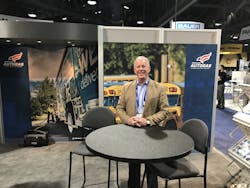Proponents position propane as the smart alternative fuel choice
LONG BEACH, CA. Surrounded by the latest in electrification and natural gas options at the Advanced Clean Transportation (ACT) Expo, Thomas “Tucker” Perkins had a reminder for fleets seeking alternative fuels.
“If payload and range matter, in the short term the answer is not going to be electric,” said Perkins. When factoring the total cost of operation, “people should look at propane,” he added.
Perkins took over as president and CEO of the Propane Education & Research Council (PERC) last May. Speaking with Fleet Owner during ACT, he said the high cost and unanswered questions with electric vehicles means it will by many years before there is widespread adoption.
For fleets running vehicles about 25,000 miles a year, propane is a potentially attractive option, especially if there is a central garage location for refueling, Perkins said.
Besides a lower overall cost of the fuel and maintenance, he called propane the “environmentally right choice,” compared with electricity, when factoring the entire end-to-end footprint. He noted electric school buses currently cost about three times as much as propane-powered buses, and do not perform nearly as well in colder climates.
Separately, Dean Stapleton, senior manager of alternative fuels for Penske Truck Leasing, said propane could be an ideal solution for certain fleets, in part because of its easy fueling solutions and easier maintenance requirements compared with natural gas engines.
In conjunction with ACT Expo, PERC issued a report showing that more than 13,000 propane autogas fleet vehicles were sold in 2017. While that was down by about 1,000 from the previous year, Michael Taylor, director of autogas business development for PERC, cited several factors restrained sales including the absence of federal incentives and low gasoline and diesel prices throughout much of 2017.
“Looking ahead, our forecasts indicate there’s a lot to be optimistic about thanks to a variety of opportunities that will help increase propane autogas vehicle sales in 2018 and beyond,” Taylor said.
Schwan’s Home Service said during ACT Expo it would take delivery of its first 200 Ford E-450 cutaway vehicles from Roush CleanTech during May. Each frozen food delivery truck is equipped with a Ford 6.8L V10 engine and a Roush propane autogas fuel system.
Schwan also said it plans to lease an additional 400 units by the end of 2018.
“Propane-powered vehicles have played a key role in Schwan’s product delivery for more than 40 years,” said Danielle Stariha, senior manager of fleet and procurement for Schwan’s Home Service. “Total costs of ownership for propane autogas is much lower than traditional fuels and other alternative technologies, which is why we are continually implementing the newest propane technology.”
Also at ACT, Agility Fuel Solutions announced its Agility’s 488LPI propane engine received certification from the Environmental Protection Agency. The engine was built on a General Motors V-8 engine block, with proprietary Agility parts, propane injection system, and controls.
About the Author
Neil Abt
Neil Abt is a former FleetOwner editor who wrote for the publication from 2017 to 2020. He was editorial director from 2018 to 2020.
